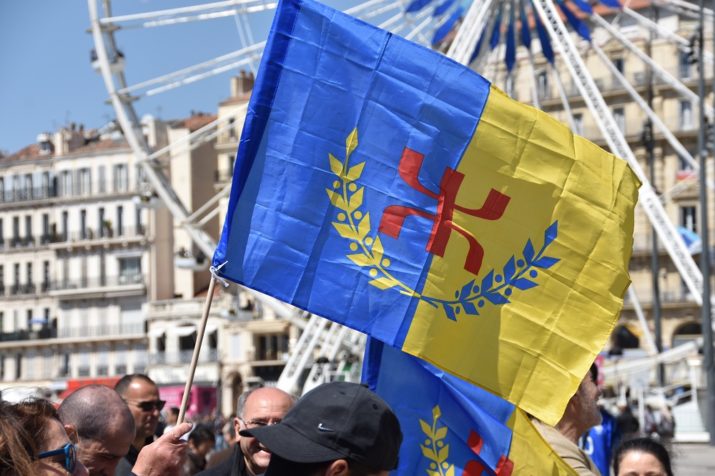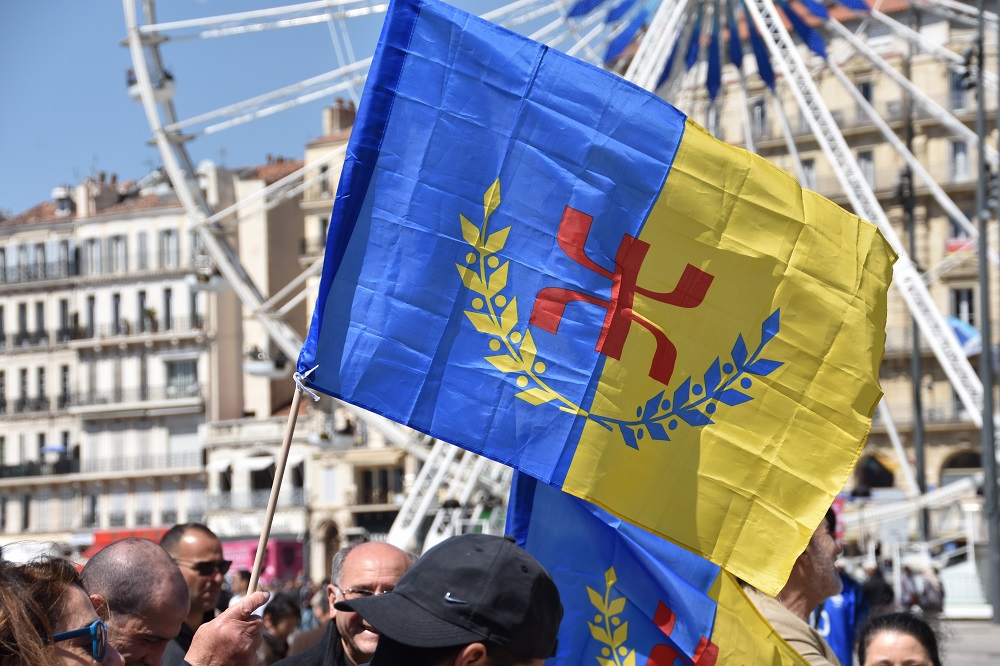

This is part of our special feature on Nationalism, Nativism, and the Revolt Against Globalization.
Nativism and nationalist populism, despite Macron’s 2017 victory over the Front National, are a significant part of contemporary French politics. Popular concerns about the weakening power of the nation-state to control the economic and demographic effects of globalization contribute to xenophobic, and particularly Islamophobic, attitudes in broader contemporary French state and society, predominantly directed at France’s large Maghrebi postcolonial diaspora.
However, part of this Maghrebi diaspora defines itself not as Arab, but as Kabyle, from the Berber-speaking region of Kabylia in North-Eastern Algeria. The Kabyle diaspora numbers hundreds of thousands of migrants, refugees, exiles, and their descendants, as a colonial-era preference for Kabyle immigrant labour in France has made Kabylia’s economy and society tightly linked to emigration over the past century. Most Kabyles are Muslims, but faith is considered by most to be private and to be kept separate from politics. Many Kabyles in the diaspora profess to have no faith, or are Christian, and resent being labelled as Muslims.
The Kabyle diaspora is organized through cultural associations, village committees, and a national independence movement, led by the Provisional Government of Kabylia (GPK). In its search for political allies in France and across Europe, the GPK highlights the Kabyle commitment to “Republican values” such as laïcité, gender equality, and democracy — playing on surviving colonial-era stereotypes that oppose Kabyles and Arabs. This article addresses how the GPK positions itself politically through its own nativist-populist discourse and practices, finding surprising articulations with both reactionary French nativist-populists but also progressive advocates of indigenous rights. It argues that this is possible because of the GPK’s location in the diaspora, the postcolonial context, and the vicissitudes of Islamophobia.
The GPK’s transnational political advocacy, which coordinates activists between France and Algeria, but also elsewhere in Europe, Africa, and North America, relies on porous borders in terms of the movement of people, information, and capital. The GPK’s politics are largely symbolic; to date, its major projects have included putting in place a Kabyle Identity Card for which supporters can register, electing a new national flag, and most recently, launching an international diplomatic corps. Beyond its ministers, of which there are never more than around ten, the GPK has put in place an organizational structure for its activists and supporters called the Reseau Anavad, which is registered as a civil society association under French law. Online, it runs a media outlet called Siwel (The Call), which is focused on Kabylia, its diaspora, and the activities of the Movement for the Self-Determination of Kabylia. For the past two years, the GPK has held several public rallies in Paris, the largest of which attracted around 10,000 supporters.
These Kabyle nationalists have developed an ambivalent positioning in relation to progressive and reactionary forms of nativism, wherein they oppose “colonial Arabo-Islamism” in North Africa as indigenous people (autochtones), but in doing so articulate an anti-Islamist, anti-Arab stance that makes their discourse attractive to figures on the French right. In the current context of increasingly influential nativist-populism in France, the GPK has adopted a nativist populism of its own to project its claim to sovereignty in the name of the Kabyle nation.
Both populism and nativism are slippery terms, but are broadly defined here as “a stylistic repertoire that opposes the ‘people’ to the ‘corrupt elites’ that (mis)govern them” (drawing on Mudde, 2007; Brubaker, 2017), and “a preference for the ‘native’ exclusively on the grounds of ‘being native’” (De Genova, 2016:223), respectively. Although populism and nativism share no necessary ideological or structural link, they have often developed together due to their shared insistence on the homogeneity of “the people” and “the nation,” particularly in Europe’s radical right. Jan-Werner Müller’s criteria of populism — that it is 1) critical of elites, 2) antipluralist and 3) a form of identity politics – demonstrate the point that populisms are necessarily exclusive of perceived “outsiders” (2016). The affinity of nativism and populism leads this article to consider them in parallel, examining the diasporic GPK’s positioning in relation to the French nativist-populist right.
Most European nativism can be broadly described as a reactionary “weapon of the strong,” as it aims to protect the rights and privileges of the already hegemonic socio-economic group against their perceived erosion by “non-native” minorities. In the field of anthropology, however, nativism can have quite a different meaning, linked to the project of decolonisation. In this context, it refers to ideologies of self-determination and emancipation that assert the indigenous population’s freedom from colonial (non-native) rule, and is rather a “weapon of the weak” (Scott, 1985), of the subaltern and not the hegemonic group. Nativisms of both kinds share the same basic argument that “local” people should have a greater claim than others to rights and resources. What differs is the way in which this claim is articulated to other discourses, governing structures, and formed subjectivities (Hall, 1979, 1988).
French government initiatives to better accommodate and promote moderate forms of Islam in France—nationally by creating the Conseil Français du Culte Musulman (CFCM) or locally in facilitating the construction of mosques—are seen by the nativist right as evidence of the government’s fear or favouritism, and of the progress of Islam in being able to influence French politics. The GPK holds a similar point of view, rejecting the idea that Kabyles should be labelled as “Muslims” by the French state or media and lamenting the existence of platforms for Islamic views to be expressed in the public sphere. Instead, they argue, the French state should prioritise laïcité, and rather than reifying the Muslim identity of its Maghrebin population should support expressions of secular indigenous cultural identity.
In seeking the support, protection, or resources of the French state at the local and national scale, its leaders highlight the Kabyle commitment to “Republican values” such as laïcité, gender equality, and democracy. Articulating with radical-right ideas, the GPK actively disengages from formal politics, encouraging its supporters to boycott elections in Algeria and preferring to stage popular protests such as marches and sit-ins. Engaging in “long-distance nationalism” (Anderson, 1992) and deploying a nativist-populist stylistic repertoire puts the GPK in an ambiguous position, as they are reliant on the porous borders and limited multicultural policies that French nativist-populists oppose.
On the other hand the GPK espouses a broadly progressive, decolonial agenda which seeks to obtain the self-determination of the Kabyle nation through non-violent popular mobilization. The GPK is represented under the umbrella of “indigenous peoples” at the UN, has recently joined the Unrepresented Nations and People’s Organisation (UNPO), and maintains a friendly relationship with the European Free Alliance (EFA) at the EU (Alfonsi and Mehenni, 2016). The Algerian state, which since independence has pursued a policy of cultural Arabization which GPK activists place within an ideology of “Arabo-Islamism,” is cast as a colonizing power in relation to the indigenous Kabyles (Mehenni, 2004, 2010).
Seeking to avail themselves of the right to self-determination described in the UN charter and the UN Declaration on the Rights of Indigenous Peoples (UNDRIP), the GPK leaders’ primary demand to the Algerian state and the international community is for a referendum on Kabyle independence to be held, in imitation of the Scottish, Catalan and Kurdish nationalist movements. The “will of the people” to decide on the way they are governed is central to the GPK’s discourse, which otherwise focuses on the emergence of a Kabyle national consciousness, symbolic politics and popular mobilization. As a consequence of this nationalist, populist rhetorical style, the GPK’s critics, beyond those that simply decry the threat it poses to the unity of the Algerian nation, condemn what they see as anti-Arab racism, populist demagoguery, and nativism.
Lacking established political allies, the GPK seeks to advance its project and form ties across the political spectrum. Perhaps surprisingly for this diaspora group, it is the nativist-populist right which had been most responsive. Figures who have publicly expressed support for the GPK include Ivan Rioufol, who has prefaced one of its president’s books (Mehenni, 2013) and authored radical-right and Islamophobic books such as L’Urgence d’être réactionnaire (2012) and La Guerre Civile qui vient (2016), and radical Zionist philosopher and journalist Bernard Henri-Levy. In the beginning of 2016, a GPK minister explained that;
“For the moment, [the] people in France who are interested in our cause are the Right-wing nationalists and the Zionists […] because they’re nationalists. They’ve seen here that in comparison with the other Algerians, the Kabyles don’t cause much of a problem. They’re not religious, not in the fundamentalist sense. They think […] that the Kabyles can integrate themselves in Western society. They have a tolerant Islam. But the other Arabophone Algerians, they’re people that… that’s what I think. [The politicians of the right] have a certain sympathy for the Kabyles. For them, there’s a positive image of the Kabyles here in France.”
The GPK minister’s reasoning above responded to three central claims articulated in right-wing nativist discourse in France: firstly, that immigrants from the Maghreb and their descendants pose a “religious problem” in the form of Islamic fundamentalism (Zemmour, 2016b); secondly, that they do not “integrate” and so create a divided society (Finkielkraut, 2011; Soral, 2012); and thirdly, that they represent a burden on the economy (Front National, 2012; Le Pen, 2017).
For the GPK, the Kabyle citizen is not only the opposite but the solution to these problems associated with immigration by French nativist-populists. Resurrecting colonial-era stereotypes, they position Kabyles as racially “Mediterranean,” hardworking and entrepreneurial in terms of the economy, and holding to secular political institutions though threatened by fundamentalist Islam. The GPK is joined in this by right-wing politicians who praise the Kabyle diaspora’s exemplary “integration” in a way that also responds to nativist fears. In the course of the 2012 Presidential elections Nicholas Sarkozy remarked on the Berbers’ “always being an example of integration in the French Republic” (Sarkozy, 2012). Ivan Rioufol expressed his support at a GPK rally to celebrate the first raising of the newly elected national flag in 2015: addressing the crowd, he said, “In many ways you [Kabyles] are exemplary in your integration but also in your courageous resistance to the coming totalitarianism” (Ivan Rioufol ‘Lever du Drapeau Kabyle, 2015), by which he meant radical Islam. Again, in 2017, Valérie Pécresse of Les Républicains checked off the whole list; “Those of Berber origin have an economic and cultural dynamism […] they are a model of integration, […] fully-fledged French citizens who engage in society. [I wish to] pay tribute to a people that is vaccine against fundamentalism, against totalitarianism” (BRTV, 2017).
Like the FN, they highlight their desire for sovereignty, which has been eroded by an incompetent centralized state apparatus in Algeria, whose “economic sabotage […] has put Kabylia back more than 50 years in its general development” (MAK-Anavad, 2017). Secondly, they highlight their attachment to ‘traditional values,’ the family, education and village society (MAK-Anavad, 2016a). Finally, they foreground liberty — of action, speech, and conscience if not of movement – whilst calling out the perceived abuses of that liberty taken by militant Islam, a foreign intrusion on their indigenous society (MAK-Anavad, 2016b). This articulation is not only discursive but is achieved through certain practices that are coded “nationalist” — for example the public display and veneration for the flag, flag-raising in symbolic places, wearing national dress, engaging in diplomatic relations in the name of the nation, creating cartographic territorializations of nation, and running a media outlet focused uniquely on that territory.
Because it stresses some of the same values and engages in some similar practices, the GPK’s movement is legible to, and can be accommodated by, the nativist-populist discourse of the French right. However, transnationally, the GPK is networked with indigenous groups and other political grouping situated more on the left. Here, I will offer three possible ways of explaining this: the diasporic context, the persistence of colonial categories in contemporary French society, and anti-Islamism.
Firstly, the GPK’s field of political action is transnational, but their primary focus is on Kabylia, not on France. They act like a bridge linking the indigenous struggle for Kabylia with the politics of citizenship and migration in France, however the meanings and effects of the GPK’s discourse and practices on their positioning in relation to Algerian and French politics are not the same. That is, to assert the right of indigenous peoples (autochtones) to national sovereignty in order to protect their cultural specificity is to argue for the independence of Kabylia in Algeria, but in France is to support the anti-immigration, anti-EU discourse of the FN. To argue in favour of laïcité in Algeria is to resist the strong state and civil society institutions that impose the religious norms of the majority in the public and private sphere, but in France is rather to support the strong state and civil institutions that impose the secular-atheistic norms of the majority in the public and private sphere. The constant tension in diaspora discourse between “here” and ‘there’ allows the GPK to flit between the two registers, positioning itself accordingly in each context.
However, there’s more than diaspora that bridges this gap — the colonial history of France and Algeria is writ large across these discussions of citizenship, race and belonging. Beyond the colonial stereotyping that causes some to compare Kabyles favourably with their Arab compatriots, the legacy of a particularly virulent war of independence continues to polarise political debate concerning France and Algeria. Not only does the nostalgia of pied-noirs and their descendants contribute to anti-Arab xenophobia of the FN and others (Stora, 1999), but Algeria’s 1990s civil war triggered an ideological struggle in the diaspora between Berberist and Islamist civil society groups, In this polarised political debate, Berberism came to stand for a secular, place-based ideal of citizenship largely based on the French model, whilst Islamism was articulated with the anti-French colonial struggle of the FLN, Arabism and a religious, universalist ideal. Today, in the French domestic politics of the era of the “war on terror,”, Islamism is described by the ideologues of the Right as opposing French Republican ideals, but now the Berber associations, the GPK among them, occupy the place of apologists of those ideals within the Maghrebin community in France. This is of course a gross simplification, but one which fits the discourse of the nativist-populism, and which the GPK uses to frame its discourse and position itself.
Opposition to and fear of Islamism, a central thread that links the GPK and the populist Right’s political projects in France, emerges out of this complex colonial history. Here, islamophobia equates Islam with its politicized extremes and sees the entry of Islam into public life as a form of “colonization,”[1] the spread of which poses a threat to the democratic, liberal life of the nation, whether that nation is Kabylia or France. In this respect, for the nativist Right fearful of the Islamic “other,” the GPK and other Amazigh actors come to be seen as “good natives.” As with the colonial-era search for native allies in the “civilizing mission” (Lorcin, 1999; Silverstein, 2003), the Amazigh are able to claim special knowledge of Islam, and offer their identity project as a sort of remedy for the ills of Islamism. One Amazigh association leader in the Val-de-Marne reported having been invited to advise the police on counter-radicalisation efforts in the area. Another in Montrieul explained that their association worked with immigration services to provide language classes and to teach “Republican Berber values” in a neighborhood where the social problems of “delinquency, drugs and theft [were leading to] the hijab and the mosque.” As Muslims themselves, the culturally essentialist reasoning goes, the Kabyles are able to “bridge the gap” between the “secular” native French and the immigrant Maghrebin “Islamists.”
Kabyle activists at the local level are able to leverage political endorsement by positioning themselves as working towards the deradicalization of young men and women of North African origin, arguing that if they really knew their “true” identity, were taught their culture and language, they would be well “rooted” and wouldn’t get involved in radical Islam. Similarly, at the international scale, the GPK presents itself and its project of an independent Kabylia as a force for greater peace and security in the region, arguing that the young Maghrebi men and women that carry out attacks in Europe in the name of Islam are a product of the policy of Arabo-Islamism pursued by the region’s governments (Mehenni, 2015).
Days before the 2017 French presidential elections, the GPK held a large march. From an official-looking podium complete with a red carpet, its president told the crowd that the GPK would instruct the diaspora on how to vote in the second round, claiming that with “more than one million Kabyle voters in France,” they could “make a president” (Igoudjil, 2017). Days later, in an open letter published online, the GPK publicly backed Emmanuel Macron against Marine Le Pen and called upon the Kabyles of France to do the same. Not only was Macron’s approach to France’s postcolonial responsibilities attractive, but his pro-EU, open border stance reassured the GPK’s leaders of their ability to circulate internationally. Furthermore, it could hope to benefit from the popular wave that carried Macron and his brand-new party into power. Of course, it is likely only a few thousand voters will have listened to the GPK’s instructions, but such a performance is aimed at incrementally building support from unconvinced Kabyles as well as the French government, as well as gaining visibility for the Kabyle diaspora. With the surprise arrival of Emmanuel Macron’s En Marche, the mainstream shifted, and the GPK shifted with it.
Jonathan Harris is a PhD student in Geography at the University of Cambridge. This article is partly based on a chapter from his forthcoming PhD thesis, entitled “Tamazgha in France; Indigeneity and Citizenship in the diasporic Amazigh movement.”
Photo: Marseille, France – May 08, 2017: Commemoration of Berber Spring | Shutterstock
References:
Alfonsi, F. and Mehenni, F. (2016) Protocol of cooperation between EFA and ANAVAD-MAK. European Free Alliance General Assembly, Katowice. Available at: https://www.siwel.info/wp-content/uploads/2017/03/ALE-MAK-Anavad.jpg.
Anderson, B. (1992) “Long-Distance Nationalism: World Capitalism and the Rise of Identity Politics”, The Wertheim Lecture, 1992. Amsterdam: Centre for Asian Studies, pp.1–11.
BRTV (2017) Yennayer 2967 – VALÉRIE PÉCRESSE, Présidente du Conseil Régional d’Ile de France. BRTV. Available at: http://www.brtvconnect.com/tamazight/994d58ab42.html.
Brubaker, R. (2017) “Why Populism?”, Theory and Society, 46(5), pp.357–385.
Finkielkraut, A. (2011) “Sommes-nous encore un Nous ? Réflexions sur le vivre-ensemble”, Causeur, 41(November), pp.25–41.
Front National (2012) UMP : un projet économique et social aux conséquences catastrophiques. Available at: http://www.frontnational.com/telecharger/argumentaires/_ump_:_un_projet_économique_pas_crédible_et_dangereux_!/projet-eco-ump.pdf (Accessed: 2 October 2017).
De Genova, N. (2016) “The “native”s point of view’ in the anthropology of migration”, Anthropological Theory, 16(2–3), pp.227–240.
Hall, S. (1979) “The great moving right show: the politics of Thatcherism”, Marxism Today, (January), pp.14–20.
Hall, S. (1988) “The Toad in the Garden: Thatcherism among the Theorists”, in Nelson, C. and Grossberg, L. (eds) Marxism and the Interpretation of Culture. Urbana: University of Illinois Press, pp.35–74.
Igoudjil, A. (2017) Ferhat Mehenni à Paris : ‘Nous donnerons des consignes de vote en France au 2e tour’, Le Matin d’Algérie. Available at: http://www.lematindz.net/news/24066-ferhat-mehenni-a-paris-nous-donnerons-des-consignes-de-vote-en-france-au-2e-tour.html (Accessed: 5 May 2017).
Ivan Rioufol ‘Lever du Drapeau Kabyle’ (2015) Naravas Production. Available at: https://www.youtube.com/watch?v=qbeg5gtaHlA (Accessed: 10 September 2017).
Lorcin, P. (1999) Imperial Identities; Stereotyping, Prejudice, and Race in Colonial Algeria. Lincoln: University of Nebraska Press.
MAK-Anavad (2016a) La Kabylie en Marche. Available at: http://www.makabylie.org/wp-content/uploads/2016/03/Toute-la-documentation-du-MAK.pdf (Accessed: 9 November 2016).
MAK-Anavad (2016b) Le Projet pour un État Kabyle indépendant. At Zellal. Available at: https://www.kabyle.com/articles/projet-etat-kabyle-independant-rendu-public-25333-16032016 (Accessed: 18 March 2016).
MAK-Anavad (2017) Memorandum for the Right to Self-Determination of Kabylia. Bondy: Anavad.
Mehenni, F. (2004) Algérie: la question kabyle. Paris: Editions Michalon.
Mehenni, F. (2010) Le Siècle Identitaire; La fin des Etats post-coloniaux. Paris: Editions Michalon.
Mehenni, F. (2013) Afrique : le casse-tête français : La France va-t-elle perdre l’Afrique ? Paris: Passy.
Mehenni, F. (2015) L’indépendance de la Kabylie et son impact géopolitique, Siwel. Available at: http://www.siwel.info/Conference-de-Ferhat-Mehenni-a-New-York-a-la-veille-du-lever-du-drapeau-kabyle-a-l-ONU_a7916.html (Accessed: 13 October 2015).
Mudde, C. (2007) Populist Radical Right Parties in Europe. Cambridge: Cambridge University Press.
Müller, J.-W. (2016) What Is Populism? Philadelphia: University of Pennsylvania Press.
Le Pen, M. (2017) 144 engagements présidentiels, Marine 2017. Available at: https://www.marine2017.fr/wp-content/uploads/2017/02/projet-presidentiel-marine-le-pen.pdf (Accessed: 2 October 2017).
Rioufol, I. (2012) De l’urgence d’être réactionnaire. Paris: Presses Universitaires de France.
Rioufol, I. (2015) “L’immigration, une menace pour l’Europe”, Le Figaro, 24 April.
Rioufol, I. (2016) La Guerre Civile qui vient. Paris: Pierre-Guillaume de Roux.
Sarkozy, N. (2012) Sarkozy Parle des Berbères, MAK GPK. Youtube. Available at: https://www.youtube.com/watch?v=E1WwQslw_gQ (Accessed: 14 September 2016).
Schor, R. (1996) “Parler des étrangers : les mots du Front national”, Cahiers de la Méditerranée, 54(1), pp.117–137.
Scott, J. (1985) Weapons of the Weak; Everyday Forms of Peasant Resistance. New Haven: Yale University Press.
Silverstein, P. (2003) “Martyrs and Patriots: Ethnic, National and Transnational Dimensions of Kabyle Politics”, The Journal of North African Studies, 8(1), pp.87–111.
Soral, A. (2012) Chroniques d’avant-guerre. Paris: Blanche.
Stora, B. (1999) Le transfert d’une mémoire: de ‘l’Algérie française’ au racisme anti-arabe. Paris: La Découverte.
Zemmour, E. (2016a) “Conférence d’Eric Zemmour du 03-11-2016”. Orange.
Zemmour, E. (2016b) Un quinquennat pour rien. Paris: Albin Michel.
[1] Nativist tropes of ‘peaceful’ (Rioufol, 2015) or ‘demographic’ colonisation by immigrants (Schor, 1996) are elided with fears that Islam will one day dominate public life in France (Zemmour, 2016a, 2016b)
Published on February 1, 2018.




